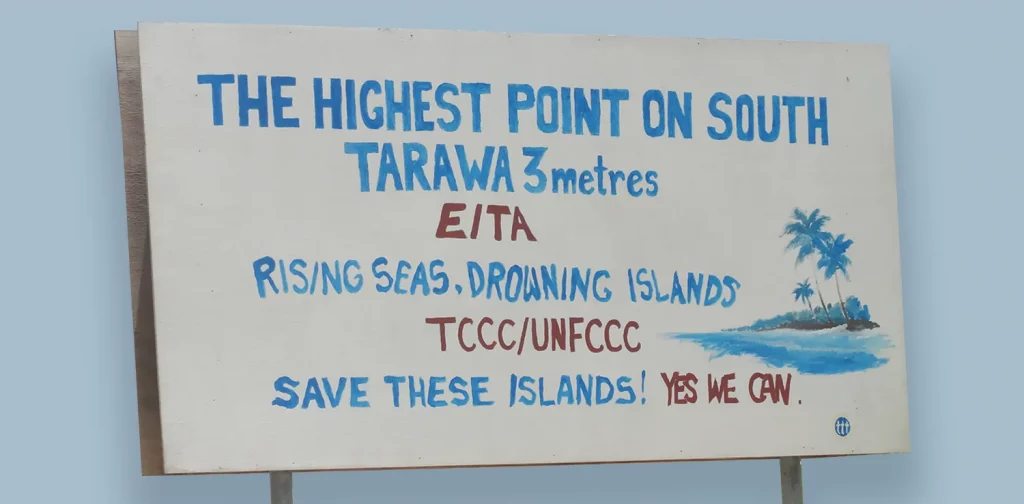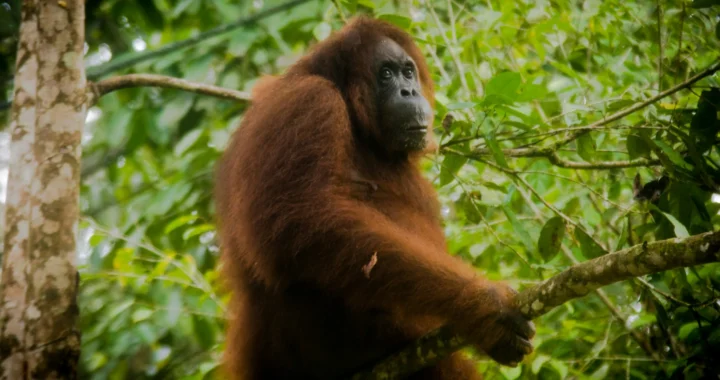Supporting Kiribati’s Climate Resilience

Photo: Erin Magee on Wikimedia Commons
People living in coastal areas and small islands are some of the world’s most vulnerable communities amid climate change. Despite not being major contributors to the climate crisis, they are bearing the brunt of its impact. Kiribati is among the first countries that will cease to exist because of the rising sea levels, underscoring the urgent need for support to help build the island nation’s climate resilience.
Kiribati’s Vulnerability to Climate Change
Kiribati is an island country located in the central Pacific Ocean. It consists mostly of low-lying coral atolls, with no part of the land rising more than two meters above sea level. This topography makes the country and its population highly vulnerable to sea level rise and extreme weather events. For instance, the combination of storms and high king tides could drastically increase the risk of flooding in Kiribati.
Furthermore, climate related natural hazards make Kiribati even more vulnerable. Droughts, intensified cyclones, and saline intrusion are challenges the region is grappling with, further compromising its ability to support its population. The country’s share of natural disaster victims is 125% higher than other similarly developed countries
Another impact to consider is migration. People from outer islands are already relocating to South Tarawa due to inadequate infrastructure, lack of access to clean water, and other climate change impacts. Consequently, this migration has resulted in elevated population density and increased unemployment on the main island.
In short, Kiribati faces the possibility of becoming uninhabitable by the end of the century. Ongoing environmental challenges and the projected acceleration of climate change create a clear existential threat, urging Kiribati to confront the profound consequences of a changing climate on its land, people, and way of life.
Supporting Kiribati’s Climate Resilience
Continued support from the global community is essential to improve Kiribati’s climate resilience. In this light, The World Bank has approved a US$10 million support package for Kiribati, aimed at enhancing the country’s resilience to economic and climate-related risks.
“This new support to Kiribati is about helping the country protect its precious environment, while building a more stable, resilient economy; one that ensures the country can look beyond the next budget cycle and make longer-term decisions,” said Stefano Mocci, the World Bank’s Country Manager for the South Pacific.
Additionally, the Kiribati First Resilient Growth Development Policy Operation with Catastrophe Deferred Drawdown Option (Cat DDO) includes an immediate grant of US$2 million for major crises or natural disasters. There is also $10 million support for the region, funded through the International Development Association (IDA).
Accelerating Climate Justice
Kiribati, Pacific Island nations, and other Small Island Developing States (SIDS) bear a disproportionate impact from climate change, despite contributing less than 1% to the planet’s greenhouse gas emissions. Meanwhile, industrialized developed nations are major contributors to global emissions and more equipped to deal with the impacts of climate change.
This glaring injustice emphasizes the need for global collaboration and responsibility-sharing. Kiribati’s limited capacity to build climate resilience intensifies the urgency for external assistance. After all, addressing climate change requires acknowledging historical imbalances and striving for equitable solutions that prioritize the wellbeing of all nations, especially those unfairly affected despite their minimal role in the crisis.
Editor: Nazalea Kusuma

Subscribe to Green Network Asia
Strengthen your personal and professional development with cross-sectoral insights on sustainability-related issues and sustainable development across the Asia Pacific and beyond.


 Looking into Biochar as a Bioremediation Agent
Looking into Biochar as a Bioremediation Agent  Australian Climate Visa for Citizens of Tuvalu: Showcasing cross-border partnership in light of the climate crisis
Australian Climate Visa for Citizens of Tuvalu: Showcasing cross-border partnership in light of the climate crisis  Nickel Mining in Raja Ampat and the Widespread Cost of Natural Resource Exploitation
Nickel Mining in Raja Ampat and the Widespread Cost of Natural Resource Exploitation  Lumbung Sosial: Challenges and Opportunities of Indonesia’s Social Barn Program
Lumbung Sosial: Challenges and Opportunities of Indonesia’s Social Barn Program  A Worrying State of Insect Decline
A Worrying State of Insect Decline  GEF Approves Funding for Biodiversity Conservation Projects in Indonesia
GEF Approves Funding for Biodiversity Conservation Projects in Indonesia